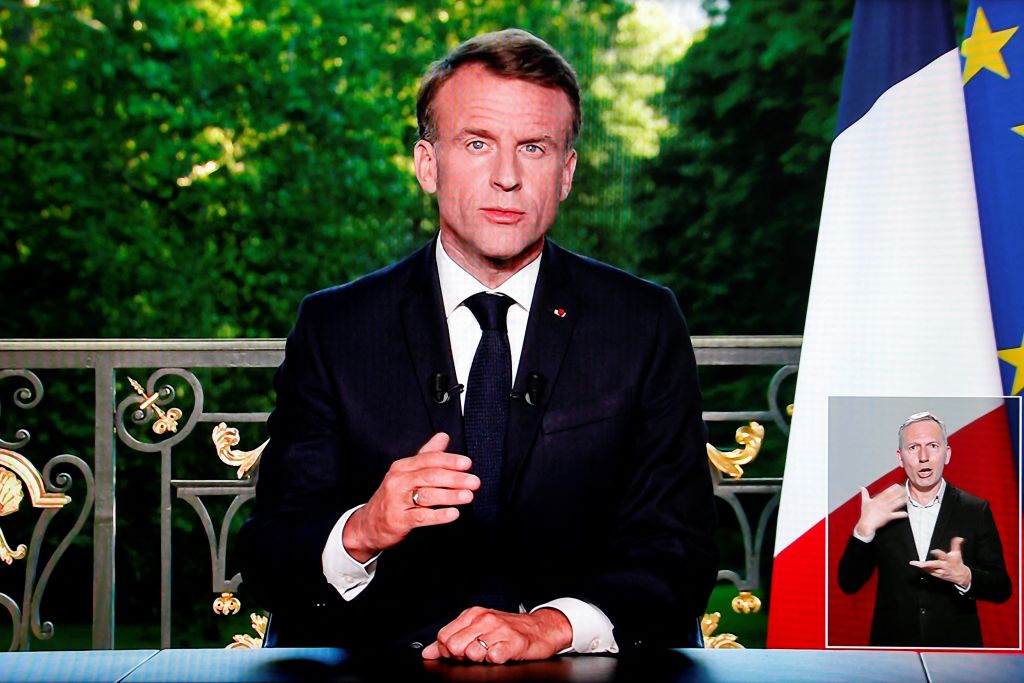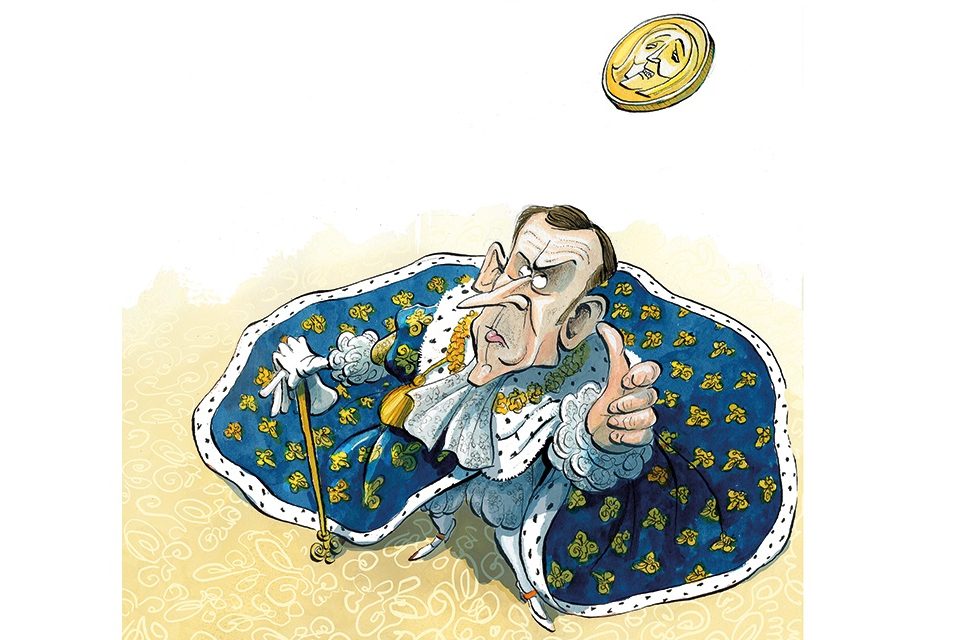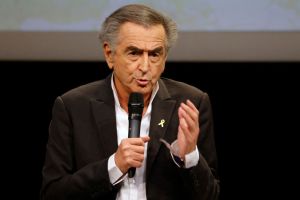Petulance, panic and performance. French president Emmanuel Macron’s broadcast following the evisceration of his party in last weekend’s elections for the European parliament had elements of all three. Wearing a black tie as if in mourning, he looked shocked, exhausted and angry. “The rise of the nationalists and demagogues,” he said, “is a threat not only to our nation but also to our Europe and to France’s place in Europe and in the world… The extreme right is both the impoverishment of the French people and the downfall of our country. So at the end of this day, I can’t pretend that nothing has happened. I decided to give you the choice. Therefore, I will dissolve the Assemblée nationale tonight.”
The European elections have convulsed French politics across the political spectrum
Was this an honest acknowledgement that he has finally recognized how deeply he has antagonized French voters? It’s doubtful.
Either way, his abrupt decision to call an election seemed baffling. It has been done before: by François Mitterrand in May 1988 and in April 1997. But they had a better chance of winning. In the European elections, Macron’s Renaissance Party won less than half the votes of the National Rally (RN): the party of his long-term presidential rival Marine Le Pen.
Renaissance is all but certain to lose the Assembly elections (first round, June 30; second round, a week later). Even if it is not guaranteed that Le Pen and her chief accomplice Jordan Bardella will win an absolute majority, the result looks likely to be a further blow to Macron’s immense self-regard on the eve of the Olympic Games in Paris — something the president has long pencilled in as his climactic moment of glory on the world stage.
“I am astonished, like almost everyone else,” said Alain Duhamel, Macron’s biographer. “It’s not madness, it’s not despair, but it is a huge risk from an impetuous man who prefers taking the initiative to being subjected to events.” His supporters are shaken and some are furious. “I don’t understand how I was able to give seven years of my life to someone so selfish,” said one of his deputies, resigned to losing his seat and heading towards the political wilderness. “He has no clue that people loathe him,” said another.

The European elections have convulsed French politics across the political spectrum. Some left-wingers rioted in Paris on Monday against what they claimed was a victory by fascists. Even supporters of the RN were thrown off balance. “It’s a huge trap,” said one Le Pen voter, suspecting as many do that Macron’s real aim is to push the right into “une cohabitation” that will end in tears — just as the socialist president Mitterrand did in 1986, when he made Chirac prime minister, after which he proceeded to undermine him before seizing total control at subsequent elections.
Macron could be plotting a similar fate for Bardella, who is now the presumed prime minister in waiting. The thinking would be that right-wing populists thrive in opposition but struggle in power. The Euro elections showed a trend: populists doing well where they hadn’t wielded power, but where they had (Sweden, Greece, Hungary, Poland), losing support.
So this is one theory: Macron plans to put Bardella and Le Pen in power in 2024, so they make compromises that might undermine their appeal as the radical alternative to normal politics in the 2027 presidential election. It may be working already. Not so long ago, Bardella was vocally opposed to Macron’s pension reform. Now, when asked if he’d repeal it as prime minister, he replied “we will see.” Nothing defangs a radical more than the responsibility of state.
But that’s a hell of a gamble for Macron to take. “The head of state takes the risk of entrusting the reins of power tomorrow to the party whose progress he had promised to stem! This unprecedented decision is for the country a leap into the unknown, the consequences of which are incalculable,” observed the center-right daily Le Figaro.
Might the French people see the Euro elections as a pointless protest vote, and hesitate before backing Le Pen and Bardella for actual power? The first opinion polls show RN almost certain to become the largest party in the new parliament. A Toluna Harris Interactive survey on Monday suggested RN would win 34 percent of the vote, almost double the 19 percent it won last time. If not guaranteeing an absolute majority, this would surely make it the largest party in the assembly. However, since the legislative elections take place in 577 constituencies and over two rounds, it is very difficult to project a specific number of seats.
What’s undeniable is that Sunday’s results were a triumph not just for Le Pen but also for Bardella. A millennial with 1.5 million TikTok followers, he represents a complete rupture from the past for a party created by Jean-Marie Le Pen, Marine’s father, thrown out of that party by his daughter when he described the Holocaust as a historical footnote. But many young Le Pen voters now have no memory of her notorious father.
Bardella grew up in a working-class suburb of Paris and has broadened the appeal of the party far beyond its traditional blue-collar base. On Monday afternoon, Marion Maréchal, Marine Le Pen’s niece, who led Éric Zemmour’s populist Reconquête at the European elections — winning 5.5 percent of the vote — visited Le Pen and Bardella at the RN headquarters in Paris, attempting to negotiate an end to the feud between the two, and a unification of the new right. “A right-wing coalition to me seems more necessary than ever,” Maréchal said.

Le Pen seems reluctant to forgive Zemmour for his refusal to back her for the presidency last time. But an even broader unification of the right could follow. Center-right Republican leader Éric Ciotti spoke on Tuesday of his wish to make an alliance with the RN for the legislative elections, declaring, “I want my political family to move in this direction.” That would break a historic refusal of traditional conservatives to treat with the populist right.
Meanwhile, even wilder theories are circulating. One is that Macron might dramatically quit after his party is defeated in July, in which case he would be succeeded by Gérard Larcher, seventy-four, the obscure president of the senate, in a caretaker role. Macron denied this on Tuesday but some are uncertain. The question is whether, if he exited in a hissy fit, would he then be eligible to run for president a third time in 2027, returning like Cincinnatus from his exile. Macron is hardly Cincinnatus, although he might imagine himself so.
Macron has repeatedly declared it “absurd” that he can’t be president for a third term and the question of whether he could run again isn’t entirely settled. “If you ask me for my personal opinion, I think it’s always better when we give voters the choice,” he once said about France’s two-term limit — adding that he would “not necessarily” stand again. The president’s allies have already suggested that denying voters the chance of electing someone for a third time “restricts the free expression of popular sovereignty.” The final eligibility decision would be made by the constitutional council, headed by Macron’s ally Laurent Fabius.
But if Macron has a wider cunning plan, he’s not immediately ready to disclose it. There is evidence of indecisiveness in the Elysée. On Monday afternoon, he announced he would hold a press conference on Tuesday. By Tuesday morning, it had been cancelled, and rearranged for Wednesday. Macron’s spinners made clear that he would be front and center of the campaign, though some of his candidates were quick to tell the press that they would rather he stayed away.
Macron’s presidency has been a catalogue of legislative failures, from his clumsy attempt to increase diesel prices while lowering wealth taxes — sparking the revolt of the gilets jaunes — to his failure to achieve the structural economic reforms he promised and to control immigration. The continuing collapse of security since he came to power, with a teacher decapitated for allegedly insulting Islam and an elderly priest stabbed to death by another Islamist while saying Mass, has infuriated voters.

This year Macron visited Marseille promising an “XXL” crackdown on gangsters. Weeks later a notorious gangster escaped from a prison van that was attacked by his mobsters. Two prison officers were killed and promises to capture the perpetrators have come to nothing. There’s been a surge of antisemitism in French cities since the October 7 attacks. And Macron’s posturing over Ukraine, threatening direct French military intervention, has not impressed the electorate. France’s generals warn that the army lacks even sufficient ammunition.
Overseas departments, notably New Caledonia, are in a state of insurrection. The economy continues to struggle as gross public debt has increased to more than 112 percent of GDP. France’s credit rating, recently downgraded, is under further threat as a consequence of the new political instability. “This snap election increases risks to fiscal consolidation,” Moody’s said on Monday, describing it as “credit negative”!for the country’s rating.
Yet those who have despaired at Macron’s incompetence and insouciance should be careful what they wish for. Much as Le Pen’s resilience seems admirable, she seems hopelessly confused about how to lead France out of its problems. Her nationalism attracts votes but her economic nous is glaringly deficient. The RN has a protectionist and essentially leftist economic policy. Bardella’s pre-election debate with now former prime minister Gabriel Attal did not reveal him to be a master of any of the crucial dossiers. His emotional intelligence can get him only so far.
The immediate consequences of the parliamentary dissolution are numerous. It marks the abrupt termination of the premiership of Attal, in office only six months, and once considered Macron’s anointed heir, discarded like a mouchoir — just as his three predecessors were. It would seem to signal the end for Macron’s proposed euthanasia law and is certainly a further dilution of his ambition to perform radical surgery on the sclerotic Fifth Republic. The minister of the interior could change only two days before the opening of the Olympic Games, with all the enormous security challenges that poses.
The dissolution also gives France a chance to look back on seven years of Macronism — and how it has left the country on the edge of political chaos — with the only mass party left being National Rally. Macron entered office styling himself as Jupiter. He has become Saturn, devouring his children.
This article was originally published in The Spectator’s UK magazine. Subscribe to the World edition here.


















